
For nearly 15 years, I was known by everyone because of my chest — and not my face or personality.
By the time I was 10, I was out of a training bra and shopping in the "little ladies" section of the store. By age 13, I was a DD. People don't believe me when I say that. However, my chest's growth was so noticeable in junior high that a rumor was started saying I'd gotten breast implants.
For nearly 10 of those 15 years, I wondered what life would be like if I got breast reduction surgery. It wasn't until I was 21 that I realized I really wanted the surgery. The pain in my neck and back was excruciating. I couldn't work out without wearing both a regular bra and a sports bra. Sometimes, I even wore two sports bras. I couldn't wear a tank top without showing excessive inches of cleavage. I felt inappropriate in a bikini at the beach. I just wanted to have normal boobs.
Being 21, though, I wasn't ready to look into the costs of breast reduction surgery. I knew that the surgery would leave me with scars, and I was vain (I still am, but I've since sucked it up).
It wasn't until after my 23rd birthday that I looked at other people's experiences and saw their breast reduction "before" and "after" photos. It was hard to deny how drastic of a change surgery looked to be. I didn't just want it: I needed it.
More from LittleThings: I Tried Using A Jade Roller And Rose Quartz Roller On My Face To Test The Benefits
But here's the thing: before I met with my surgeon, I hadn't even realized what surgery entailed. It was often hard to look at photos of other women's experiences because the photos were so intimate. Fortunately, if you're not comfortable looking at images of other women's boobs, this is a much safer review of surgery. A surgeon can show you those "before" and "after" photos.
Keep reading below to see a "safe for work" list of 10 things every woman considering a breast reduction surgery should know.
What Is Breast Reduction Surgery?
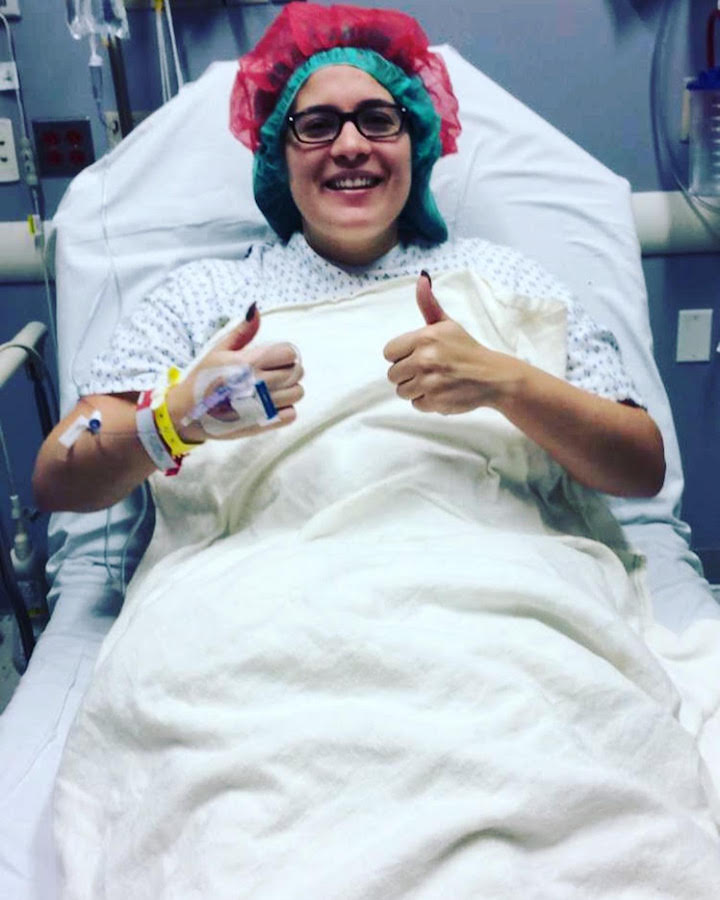
Simply put, a breast reduction is a surgery to make large chests smaller. However, there is so much more to it than that.
"Breast reduction, also known as reduction mammaplasty, is a procedure to remove excess breast fat, glandular tissue, and skin to achieve a breast size in proportion with your body, and to alleviate the discomfort associated with overly large breasts," according to plasticsurgery.org.
What that doesn't really tell you is this: breast reduction means you will have centimeters (or inches) of skin cut off your body, fatty breast tissue removed, and multiple nerve endings cut and put back together. The most notable part of surgery is that your nipples will be cut off, resized, and placed higher on your breast.
On top of that, you will have two drains and too many stitches to count directly after surgery. The drains are hooked up to your chest as a way to catch excess fluids from surgery. They come out after three to seven days, depending on how much fluid is draining out of you. All of your stitches will come out roughly two weeks after surgery.
Tip #1: You Will Have To Wear A Bra 24/7

This is something I had not, under any circumstances, realized before I had the procedure. My surgeon most likely mentioned it to me, but I was so excited to finally get my surgery that I could have missed this part. And let me tell you, it is something you do not want to miss.
I loved not wearing a bra. The second I got home every day, I would quite literally rip my bra off and throw it. I was ready to not wear a bra after surgery, as I knew I could "get away with it." Having big boobs, on the other hand, made me feel like I couldn't get away with it: it was just too noticeable when I wasn't wearing a bra, and it would leave me feeling embarrassed and ashamed.
Well, you need to wear a bra, day and night. After surgery, your breasts are like molding clay, meaning they will change shape for months. Even six months out, mine are still changing. A good, supportive bra helps your breasts get a nice, desirable shape.
Tip #2: You Might Never Be Able To Wear Underwire Again
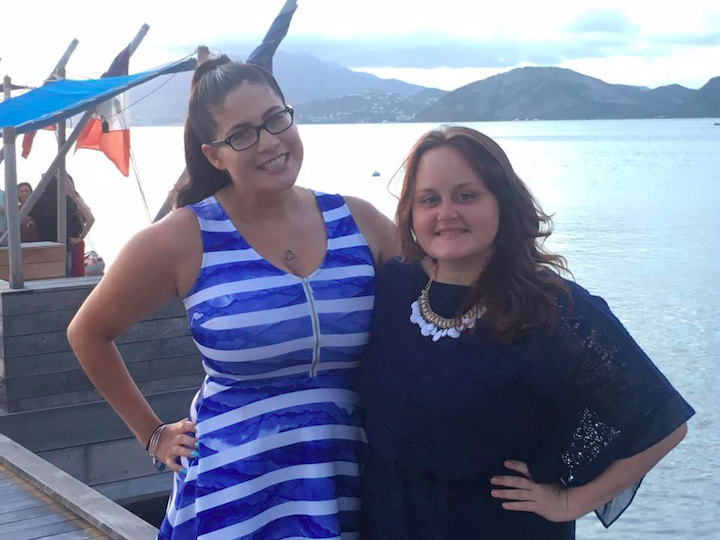
Going off the fact that you need to wear a bra 24/7, you will first be told you cannot wear underwire bras. Every woman with a large chest knows that does not sound right. How will I get any support without underwire?
Those first six weeks after surgery, the incisions will be too sensitive for underwire. So, you're tasked with finding a supportive bra that has no underwire. Don't settle for the first one. Try on every bra that fits these criteria, as you'll be wearing it a lot!
When you're cleared to wear underwire, you will learn which bras you simply cannot wear. The underwire sits right on top of your scars and will be extremely uncomfortable. I personally cannot wear any bras that have zero padding. Anything that is very lacy is also too uncomfortable. Still, I will say that having smaller boobs helped me find a line of underwire bras that worked for me. I bought five bras, just because they weren't $65 each.
Tip #3: Your Nipples Will Change — Drastically
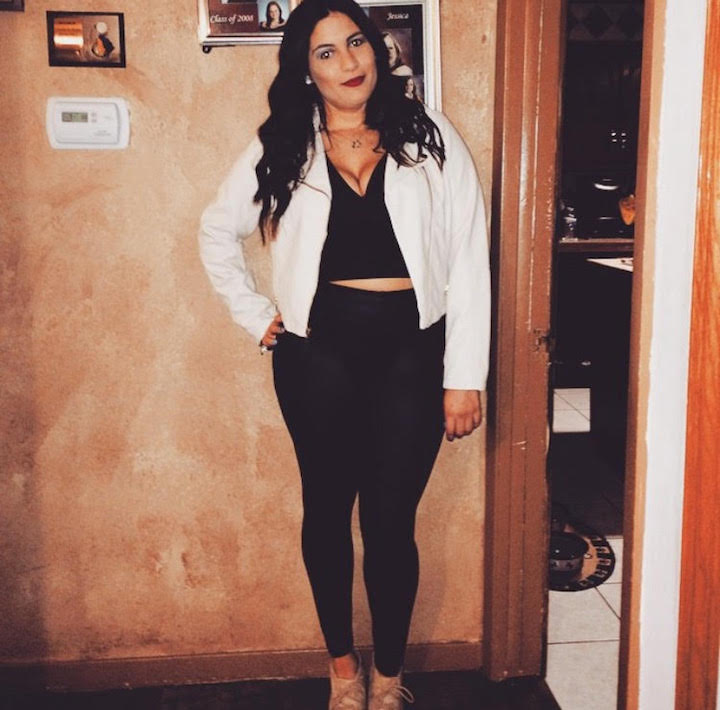
There is no delicate way to put this. Once you have surgery, say goodbye to the nipples you once knew. This is the biggest change, even when compared to the drastic size difference of your breast. Your nipples will be a main point of confusion for a while.
Prior to surgery, I was warned that I might lose feeling in my nipples. There was a chance I'd never get sensation back. So many nerves are cut in the process that you won't even realize at first if you can or cannot feel anything. It will take months to regain all sensation, though you'll notice fairly quickly whether or not you have a normal level of feeling.
People can have oversensitivity after surgery, which is normal for six to eight weeks after the fact. Some people will have higher or lower sensitivity for the rest of their lives. I was lucky to not be afflicted by this.
But that isn't the only thing. As I mentioned earlier, your nipples are cut off and placed higher on your breast to be proportional. This is something I am still not used to. Wearing a bikini proved to be a whole new experience based solely on this.
Tip #4: You Need A Full Week Off From Work, At Minimum
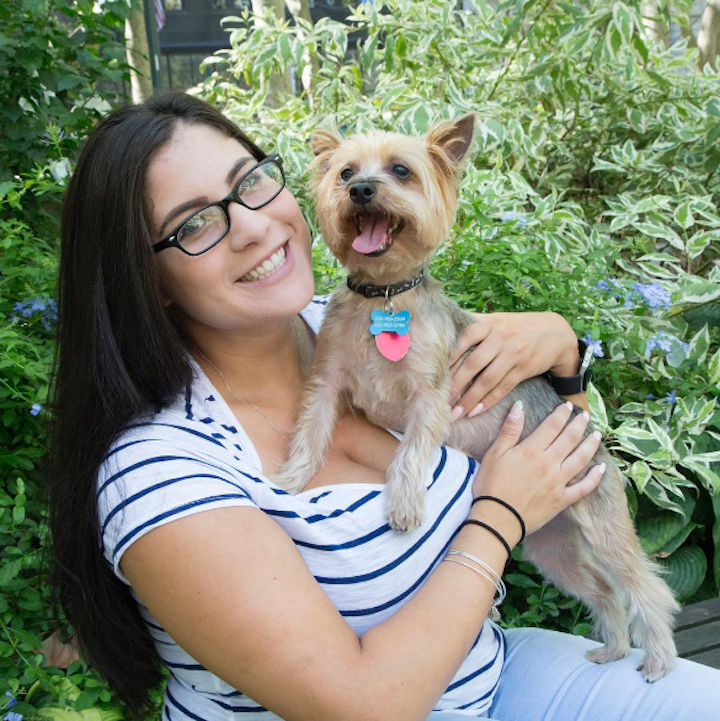
If you are anything like me, you will convince yourself you can get right back to work — even though you really can't.
I was very lucky after my surgery to have the option of working from home. I'd talked to my bosses and we agreed on the weeks suggested by my surgeon, as it would keep me off mass transit. However, I ended up only taking one day off from work.
My surgery was on December 23, 2016, which meant I had time off for the holidays. I only took off December 27 and quickly realized that it was a big mistake. I was on Vicodin for the pain after surgery and didn't realize just how sleepy it would make me.
I was unable to keep up with the fast pace of work that first week back. I wish I had taken the time to just sleep and let me body heal. I should have taken the whole week off and spent it snuggling with my dog!
Additionally, I recommend you take the day off for your follow-up appointments. Getting your drains taken out after surgery will be uncomfortable. But be warned: the day you get your stitches out is an awful day. All you're going to want to do is get back in bed and sleep for hours. I am a wuss when it comes to pain, so I cried during that entire appointment.
You should consult with your doctor to determine the best course of action on getting back to work after surgery.
Tip #5: You Might Not Be Able To Breastfeed
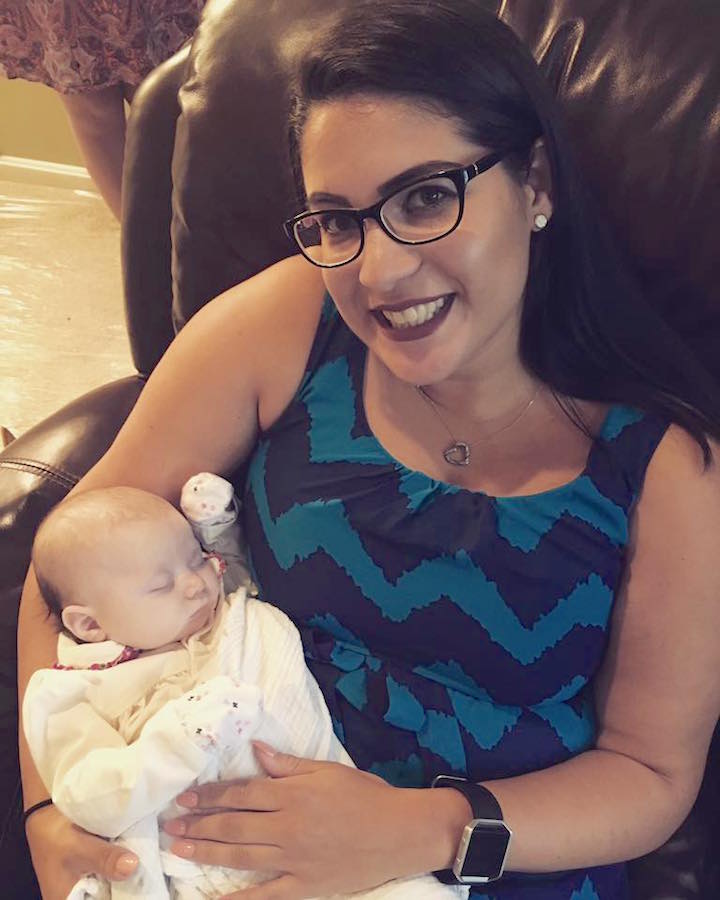
This is something that I was warned of, but I was not told there is no way to actually tell directly after surgery. I hadn't realized I would need to wait until I got pregnant to find out if I could or could not breastfeed a child.
Given that I am nowhere near ready to have a kid, I wasn't even considering this prior to surgery. But after being asked by dozens of people what I am going to do when I have a baby, it has made me wonder: Can I breastfeed? And if I can't, is it the end of the world? For me, it wouldn't be. But everyone has their own opinions.
If your plan is to breastfeed a child and you have yet to have one, this is something that seriously needs to be considered. I was told by my primary care physician and surgeon that breast reduction surgery can cut these chances in half. Having sensation back so quickly after surgery is a good sign, I am told, that breastfeeding might just be on the table. But I won't know until I am pregnant. Check back in roughly five to seven years!
Tip #6: It Will Revolutionize How You Work Out
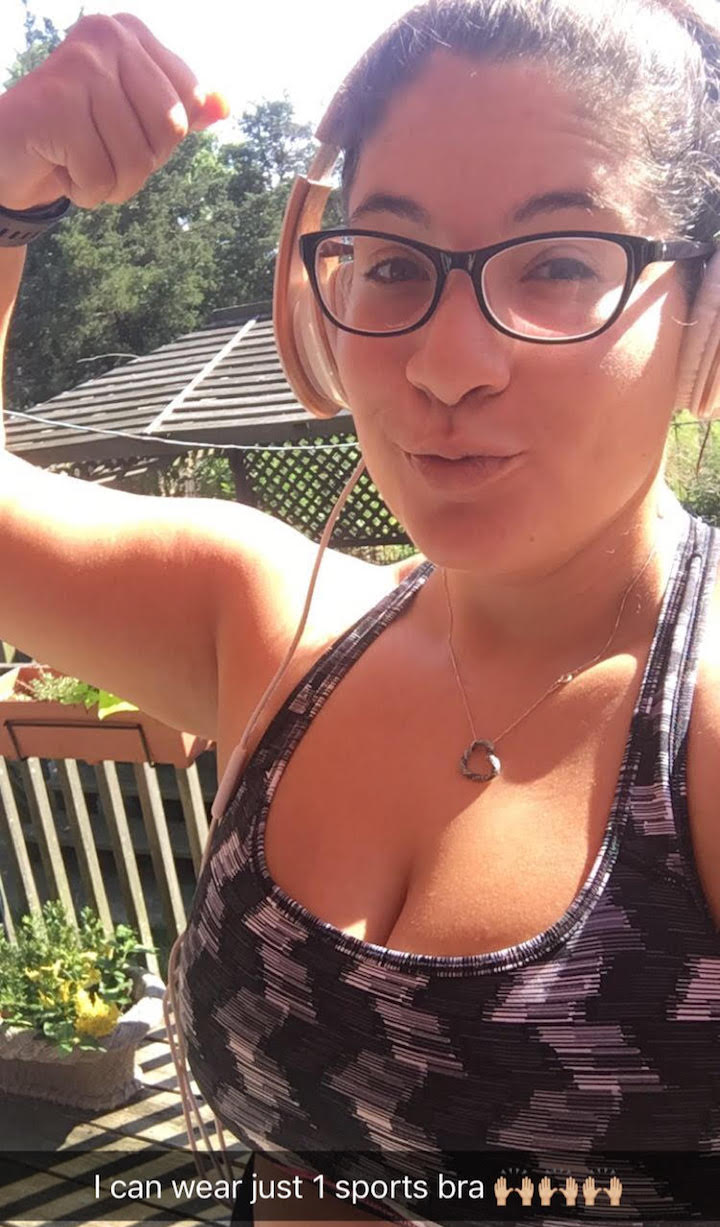
I had high hopes that getting this surgery would make working out more comfortable. And let me tell you, it has never been this easy.
Like I mentioned earlier, I used to wear a bra and two sports bras for every workout. Wearing one sports bra was not an option; even with a regular bra, just one sports bra wasn't enough to keep the girls in. I needed all three levels to feel semi-decent — but it was still uncomfortable. Any time I ran, I felt like I was trying out for Baywatch.
After surgery, I was on a strict "no working out for three weeks" rule from my doctor. When that time passed, I felt OK going for walks on the treadmill. When I put my sports bra on for the first time sans "regular bra," it was the strangest yet most satisfying moment I'd felt. My boobs didn't move! Even when I jumped, they were secure.
I couldn't lift weights comfortably for about six weeks after surgery, which my surgeon said was totally normal. In fact, it was recommended that I wait until it "felt right." After I hit that threshold, I could lift my little baby weights at the gym, do burpees and high knees, and feel incredible!
In the photo above, I am six months out from my surgery, finally able to work out in a single sports bra. Success!
Tip #7: Breast Reduction Surgery Results Do Not Look Like Breast Implants
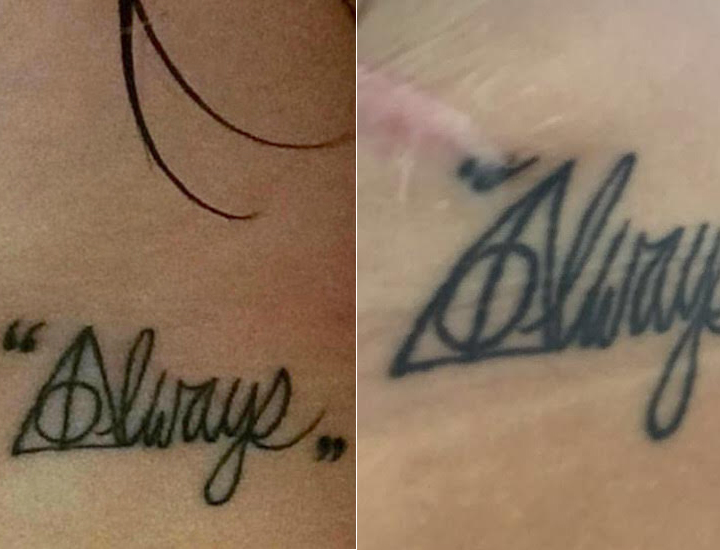
A misconception I had before surgery was what my breasts would look like afterward. In my head, I imagined I would look like a woman who had gotten breast implants.
I knew that I'd have scars, whereas women who get breast implants do not have visible scars. I hadn't really thought about the fact that these two surgeries are performed differently, which is why I would have scars and my breasts would look different.
Simply put, implants were made to look as aesthetically pleasing and symmetrical as possible. Breast reduction is a little bit tougher as your surgeon will not only be cutting you open, he will also be slicing off skin tissue and moving your nipples.
Breasts after reduction don't look sloppy or unsymmetrical, though they are a little boxy right after surgery. Your bra will reshape them to the typical rounded shape, but be prepared to have a lot of scars. From the middle of your rib cage to the center of your chest, a scar will stretch under each boob. Also expect a scar around the entire nipple, connecting down to that bottom scar.
A final note: if you have a tattoo on your rib, or under one of your breasts, it might get cut into. As you can see in the photo above, my tattoo was slightly altered! A coworker told me that it was poetic that my Harry Potter tattoo got a scar of its own.
Tip #8: This Surgery Is Same-Day

Same-day means you are in and out that day, unless there are complications. Depending on when your surgery is scheduled, you can even make plans for that night.
My surgery was bright and early at 7 a.m., which meant I was at the hospital by 5 a.m. Given that I am young, I didn't need blood work done prior to surgery. I just needed a urine sample taken to confirm if I was or wasn't pregnant. (Spoiler alert: I wasn't.)
Since I was on time and healthy, everything went according to schedule. The only hiccup of the morning was when I found out I had to take off my underwear in case I needed a catheter during the four-hour-long surgery. Given that I was sleep-deprived and had been fasting for 12 hours, I was not a happy camper. I at least got a milkshake and fries later that day, so it was OK.
I was in the recovery room by 11:30 a.m., where I asked the nurse in my loopy state if I'd gotten that pesky catheter. When she said no, I went back to sleep and woke up as they wheeled me to my room at 12:30 p.m. I was done so quickly that my parents weren't even back at the hospital when I woke up! My best friend and her mom gave me all my Christmas presents. Less than two hours after waking up, I was walking around the room and leaving the hospital. I even had friends over that night to exchange more gifts!
Tip #9: Your Back Will Still Hurt Doing Certain Things
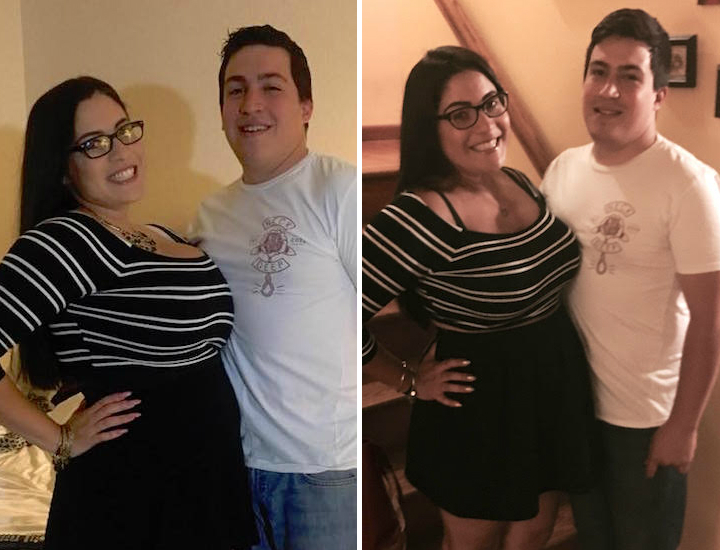
The first time I did the laundry after having surgery, I was angry to learn that my back still hurt when doing it. When I told my coworkers about this the next day, they started laughing at me; apparently, everyone's back hurts doing the laundry.
I hadn't even realized that that pain didn't stem from my breasts. I had always figured the two were directly related. I've personally only noticed pain that seems reminiscent to the old back and neck pain after I've sat really improperly.
Other than that, I haven't had that aching neck pain in months now. Even as I was getting ready to wear a bikini for the first time since surgery, I dreaded the pain that came from my top cutting into my neck. Luckily, it didn't happen! I was so surprised, I thought I was imagining it all.
When I posted the picture on the left in 2016, my mom text me saying I needed to get reduction surgery. My boobs were officially too big. On the right, this is me, more than 6 months out from my surgery — and I've never looked back!
Tip #10: Insurance Will Cover It, If You Fight Hard Enough
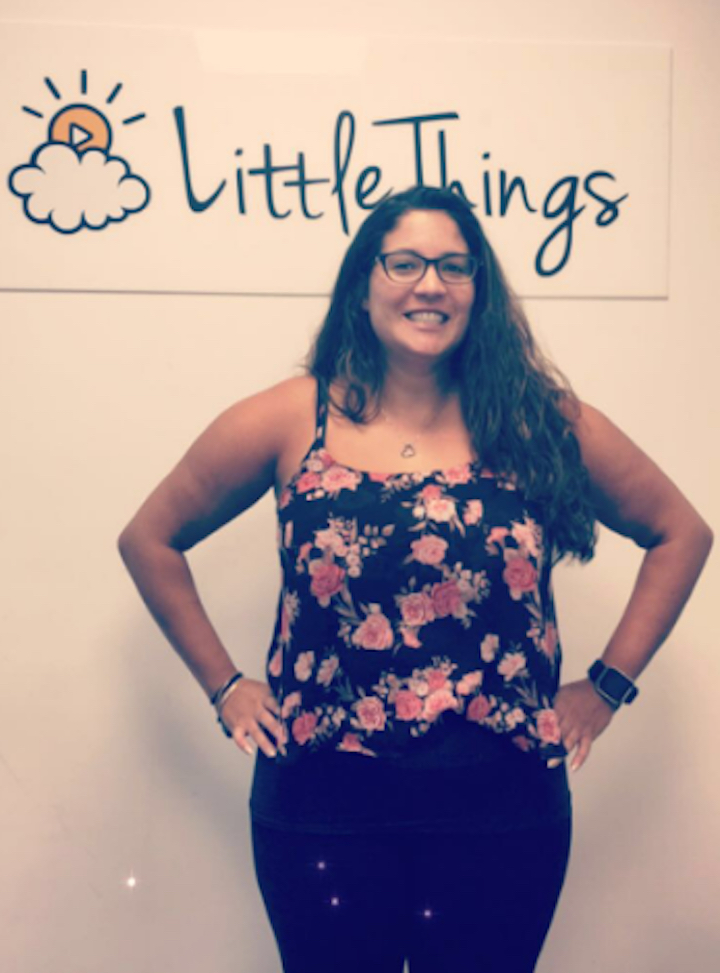
If you've ever ridden a New York subway, you've probably seen advertisements for breast implants starting "as low as $3,700." While I don't think I'd trust any place doing implants for that cheap, I had no idea that breast reduction cost so much more.
According to EnhanceMyself, breast reduction surgery costs anywhere from $6,000 to $12,000. Not many people have a spare $6,000 lying around, so the option with breast reduction surgery is to have your insurance provider cover it.
From my experiences with insurance companies, they do not want to cover it. They will fight with you like toddlers saying "no" and "I don't wanna." (OK, not really, but they are very stubborn.) Before you even attempt to make the request to have your surgery covered by insurance, you need to start a log of "why you need it," as if your overly large chest isn't evidence enough.
Every doctor's appointment you've had related to neck and back pain needs to be added to your arsenal. I had an entire document drawer filled with appointment records, X-ray reports, and physical therapy sessions. I also had a previous request for surgery that helped me get approved.
My surgeon told me that many women are denied the first time. I first applied in 2014, and I was one of those women. For a while, I was defeated and gave up hope on surgery. Then in 2016, my mom sent that text and I knew she was right.
My entire wardrobe revolved around my boobs and they had officially taken over my body. It took nearly two months, but in 2016 I set to work on getting insurance to approve the surgery. My surgeon's assistant told me she thinks I harassed the insurance company so much in those two months, they gave up and just said yes!
After everything, my surgery only cost me $180, and that was for my nine-hour hospital stay.
Is It Worth It?

Breast Size Before: 40H
Breast Size After: 36DD
Amount Taken Out During Surgery: Three pounds per breast
From my experiences, this surgery was beyond worth it. It is a huge life change. I would tell anyone who has even slightly considered it to look into her options. I feel like a new person after surgery.
I am still learning more about my body six months after surgery, but I haven't had any regrets over the choice I made. My biggest fear was that I'd miss my boobs, as they were practically what I was known for. If you didn't know my name, it was a common joke that people would say, "The girl with big boobs and glasses? Oh yeah, I know her!"
They felt so much a part of me, I didn't think I could be sexy without them. But I learned pretty quickly after the procedure that the surgeon wasn't lobbing my chest off. I still very much have boobs. I still feel confident in my own skin. And I no longer feel like that is the reason I should feel confident.
Over time, I realized I was making life choices around my boobs. I wouldn't wear tank tops, because I'd look scantily clad. I couldn't wear flowy shirts without the fear of "looking pregnant." I didn't wear certain colors or patterns because they weren't flattering. I couldn't run without feeling neck pain. But all of that has changed and made me realize what an amazing choice I made by getting this surgery.
Please SHARE this with any friends who have considered breast reduction surgery!
To learn more about breast reduction procedures, research surgeons in your state and contact your insurance provider to see what options they offer.




